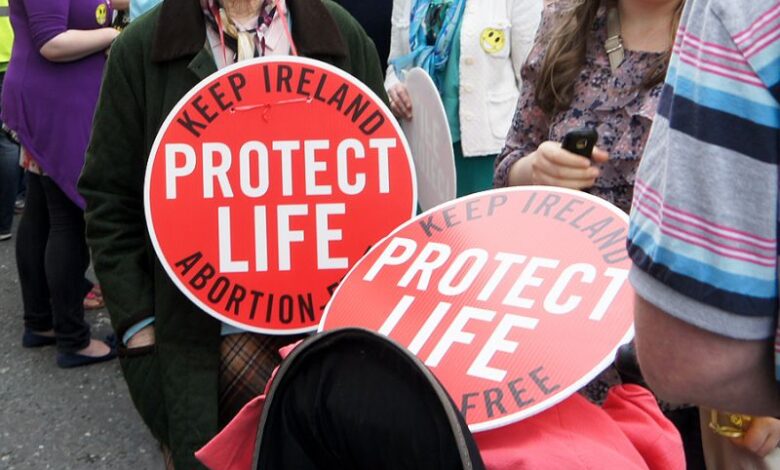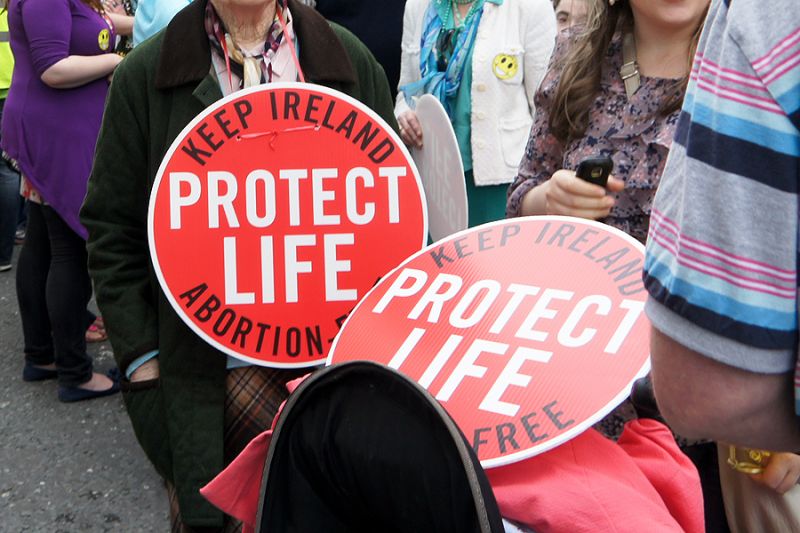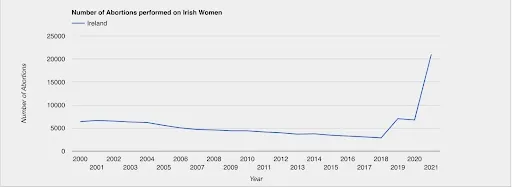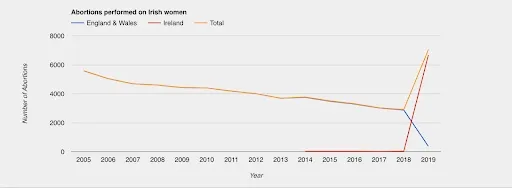Nearly 30,000 abortions in Ireland since referendum came into effect, pro-life group says

 An all-Ireland pro-life rally in Dublin. / William Murphy/infomatique via Flickr (CC BY-SA 2.0).
An all-Ireland pro-life rally in Dublin. / William Murphy/infomatique via Flickr (CC BY-SA 2.0). Rome Newsroom, May 25, 2023 / 14:15 pm (CNA).
Five years after Irish voters rejected the constitutional amendment that protected “the right to life of the unborn,” more than 28,800 abortions have occurred in Ireland since the referendum came into effect.
Irish Sen. Rónán Mullen called losing Ireland’s pro-life Eighth Amendment in the referendum vote on May 25, 2018, “the most tragic moment in Irish political history” in terms of the number of lives lost.
According to Ireland’s Pro-Life Campaign, the country’s annual abortion rate has increased by at least 70%, with 28,802 abortions performed in the republic since the referendum came into effect in 2019.
New data provided by Ireland’s Health Service Executive on May 25 revealed that there were 8,876 abortions performed in Ireland in 2022 alone, a 33% increase from 2021.
“When we look at the change that has happened since it became legal, the most obvious change is that our abortion rates have gone up dramatically,” Mullen said in an interview with CNA.
Eilís Mulroy, the CEO of the Pro-Life Campaign, said the “alarming” rise in the abortion rate “points to the utter failure of the government to provide adequate safeguards and pathways to positive alternatives.”
One baby is being aborted in Ireland for every seven babies born, Mulroy told CNA.

The amendment legalizing abortion came into effect in January 2019. Mullen noted that in the first year that abortions were legalized in Ireland the number of abortions was 6,666, “a number that was not lost on lots of people.”
He added that Ireland’s Down syndrome population has been particularly affected by the referendum.
“We live this paradox where many of us in our community still want to celebrate the presence of people with Down syndrome among us. We champion the love and the participation that they bring to our world, and yet we’re working for the world where they will no longer exist,” Mullen said.
Irish government considers further pro-abortion measures
The Irish government is currently considering a recently released report by the chairperson behind a three-year review into Ireland’s abortion laws.
The report has been widely criticized by pro-life advocates as “based on selective evidence and poor-quality research,” according to Mulroy.
Ireland’s March for Life on May 1 brought out thousands of people who marched in Dublin from St. Stephen’s Green to the front of Leinster House protesting “the extreme proposals” contained in the review report.
The report recommends decriminalizing abortion entirely, which would effectively allow for abortion on request up to birth.
Elective abortions are allowed in Ireland up to 12 weeks of pregnancy and later in cases of fatal fetal abnormality or where the woman’s life or health are deemed to be at risk.
“It has been incredibly irresponsible for the three-year review, which failed to present an accurate estimation of the abortion rate, to focus so heavily on dramatically expanding the abortion legislation,” Mulroy told CNA.
“The review should have been an opportunity to objectively assess the impact and operation of the abortion law.”
Instead, she said, the report is “effectively like a blueprint for more abortion as a whole document and has failed to do anything to address the massive abortion rates or to do anything to support women.”
The report also recommends that the eight remaining maternity hospitals in Ireland that do not perform abortions be forced to do so, raising concerns about conscience protections for doctors and nurses.
“Ireland has transformed from a situation where any potential change to Ireland’s abortion laws would require a referendum of the whole people, to a new situation where extreme proposals can be made by unelected appointees without any serious media scrutiny or parliamentary accountability,” Mulroy said.

A closer look at the numbers
Pro-life advocates have also criticized the review report’s claim that there were approximately 17,820 abortions in the Republic of Ireland between January 2019 and December 2022.
“This figure is grossly inaccurate, and underrates the real number by 40%,” according to the Pro-Life Campaign.
Mulroy explained that the Health (Regulation of Termination of Pregnancy) Act 2018 required that doctors fill in a notification form to the Minister for Health after they’ve performed an abortion, which is compiled and released in an annual report.
However, for the abortion rate in 2021, the number of notifications submitted by abortionists to the government was far out of step with the number of claims made for reimbursement for abortions performed. While 4,577 notifications were received, abortionists submitted reimbursement claims for 6,683 abortions performed in 2021.
“The Department of Health acknowledged this in a supplementary note on the DOH website when releasing the annual report for 2021 in the summer of 2022. Obviously, doctors had been performing abortions, claiming money, but not filling in the notification forms,” Mulroy said.
The Pro-Life Campaign came to a total of 28,802 abortions performed in the Republic of Ireland from 2019 to 2022 by looking at the numbers of notifications and claims over the years since the referendum went into effect.
In 2019, there were 6,666 notifications of abortions performed. In 2020, 6,577 notifications. In 2021, 6,683 claims were filed. And in 2022, 8,876 abortion claims.
“All this information points to an explosion in the number of Irish babies aborted since the repeal of the Eighth Amendment five years ago and the consequent introduction of the new legislation,” Mulroy said.
“Even if we account for the number of women with Republic of Ireland addresses who had an abortion in Britain annually plus the estimated number of approximately 1,000 abortion pills taken each year illegally in Ireland (ordered online) [before the referendum], we are still looking at a 70% increase in the years 2019–2022.”
Mullen noted that “even by the government’s own figures, it’s clear that there has been a large increase in the number of abortions.”
“And that shouldn’t surprise anybody because when something becomes legal, it becomes permissible.”
Supporting the cause of life in Ireland
Mulroy said that mobilization is needed to try to get more pro-life politicians elected in Ireland’s next election to bring about change.
Sen. Mullen, who leads the Irish political party Human Dignity Alliance, has also asked people to pray for Ireland.
“To change the world, we need prayer, sacrifice, and action,” Mullen said.
“I would ask people for their prayers for Ireland, for better laws in Ireland, and for good and dare I say it, better leadership around some of these areas,” he said.





